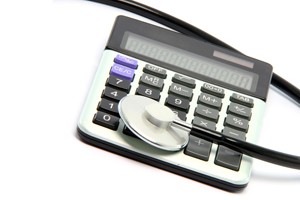Here and on other PF blogs, you’ll hear us all talking about the need for a well stocked emergency fund. And, unless you have one, you likely don’t know that we aren’t just saying that because we think we should. They really do have the benefits that we claim they do. These last couple of weeks, my wife and I realized those benefits.
Early on March 26th, my then pregnant wife told me that I should probably stay home from work as it was appearing very likely that we would be having a baby that day. Less than two hours later, we were checking in to the hospital to do just that. If you’ve been there, I don’t have to tell you that it was incredibly exciting.
The excitement waned as we waited for the labor to progress and then quickly disappeared altogether when the baby began having decelerations in it’s heart rate. The doctor began making preparations and the birth was expedited. Rather than wait for the labor to progress as it would normally, my wife was instructed to push with all she had to get that baby out. Quickly afterwards, the baby (a girl!) was born, and just as quickly was taken to a warming table to be intubated and have her lungs and stomach suctioned and checked.
It turns out that sometime in the weeks leading up to her birth, she had *ahem* pooed in her amniotic sac. To the medical world, it’s called Meconium. And it’s pretty bad. It affects the lungs in that it acts as a stopper for the little sacs that do the oxygen intake. It also acts as an irritant to the lungs that can lead to infections. It can be very serious, and can take days, or weeks, or months to completely clear out.
In our case, luckily or not, our little girl was able to kick it in a week. Pretty average recovery time we’re told. Now, she’s home and all is well. There won’t be any lasting effects and we shouldn’t be able to tell the difference.

We didn’t have time to balance our check book, or check our budget to make sure we were within bounds on something. And now that it’s all over, I can honestly say that if we hadn’t had an emergency fund, it would have been much, much worse.
One of the touted benefits of an emergency fund is the peace of mind that it affords you. When you know that you have that money to fall back on in an emergency, your mind is free to worry about the things that it should be. In this case, it was our daughter. Maybe it would be the car you just wrecked or the house that just burned down. No matter what the emergency is, you know that you’ve got that extra cushion of money to help pay any bills or expenses that might come up.
I cannot tell you how wonderful it was to not have to worry about that during the week that she was in the hospital. We certainly didn’t expect to have any problems, but we did. You may not expect any problems, but they can happen. If you’ve been putting off the funding of your own emergency fund, don’t wait any longer. We’re glad we didn’t. You never know when you’ll need it.
Photo Credit: forwardcom @ sxc.hu

I started this blog to share what I know and what I was learning about personal finance. Along the way I’ve met and found many blogging friends. Please feel free to connect with me on the Beating Broke accounts: Twitter and Facebook.
You can also connect with me personally at Novelnaut, Thatedeguy, Shane Ede, and my personal Twitter.
